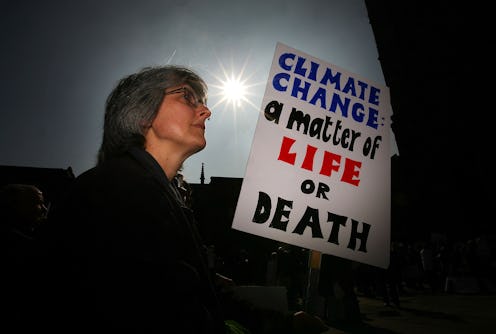News
This New Climate Change Report Warns "Marginalized Communities" Will Be Impacted Most

On Friday, the federal government released a sweeping report about climate change with a clear, unambiguous message: Global warming is real, serious, and will have catastrophic impacts on the United States if significant action isn't taken to stop it. But those effects won't hit everybody the hardest: The national climate change assessment warns that "marginalized communities" will be impacted the most by rising global temperatures.
The report — officially Volume II of the Fourth National Climate Estimate — was produced by the U.S. Global Change Research Program, and its release was mandated by Congress. Written by 91 authors from 40 different countries, it outlines the effects climate change has already had in the United States, and warns that it will have an even more disastrous impact on the country under the status quo.
"Future climate change is expected to further disrupt many areas of life, exacerbating existing challenges to prosperity posed by aging and deteriorating infrastructure, stressed ecosystems, and economic inequality," the report's authors write. They note that climate change, in addition to directly affecting the environment, will have deep and lasting effects on the U.S. economy as well.
But these consequences, the report warns, "will not be distributed equally."
"People who are already vulnerable, including lower-income and other marginalized communities, have lower capacity to prepare for and cope with extreme weather and climate-related events and are expected to experience greater impacts," the authors write.
Although it affects everybody, climate change poses an especially great risk to "low-income communities, some communities of color, children, and the elderly," the report says, and threatens to "exacerbate existing social and economic inequalities that result in higher exposure and sensitivity to extreme weather and climate-related events and other changes."
This confirms earlier reports on the subject, which have come to similar conclusions regarding the disproportionate effects of climate change. In 2016, a United Nations report concluded that climate change is already "taking the largest toll on poor and vulnerable people," thanks to the "failure of governments to close the development gaps that leave large population groups at risk."
“Sadly, the people at greater risk from climate hazards are the poor, the vulnerable and the marginalized who, in many cases, have been excluded from socioeconomic progress,” Ban Ki-moon, then the Secretary-General of the United Nations, warned in the World Economic and Social Survey 2016. “We have no time to waste—and a great deal to gain—when it comes to addressing the socioeconomic inequalities that deepen poverty and leave people behind.”
The Trump administration drew criticism for releasing its climate change report when it did: On Black Friday, one of the slowest news days of the year, when Americans are more likely to be shopping or spending time with their families than diving into the headlines of the day.
"Releasing the National Climate Assessment on Black Friday won’t obscure the fact that authorities are still identifying bodies in California’s unprecedented megafires, Florida is still dealing with toxic algae outbreaks fueled by warmer water, and Americans are still picking up the pieces from Hurricanes Florence and Michael and Typhoon Yutu that were worsened by climate change," National Wildlife Federation CEO and President Collin O’Mara said in a statement, adding that it's "an absolute disgrace to bury the truth about climate impacts" by releasing such pertinent information the day after Thanksgiving.
Per its congressional mandate, the National Climate Assessment has been released every four years since 1989. It incorporates input from 13 different federal agencies, and is meant to be a inform policy decisions by Congress and the president.